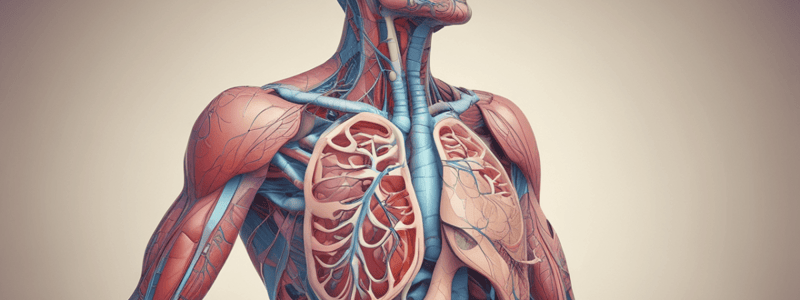Podcast
Questions and Answers
What is the term for the process of breathing out?
What is the term for the process of breathing out?
- Respiration
- Exhalation (correct)
- Oxygenation
- Inhalation
What is the gas produced by the body's cells when they use oxygen to create energy?
What is the gas produced by the body's cells when they use oxygen to create energy?
- Carbon dioxide (correct)
- Nitrogen
- Helium
- Oxygen
What happens to the carbon dioxide in the blood when it's time to exhale?
What happens to the carbon dioxide in the blood when it's time to exhale?
- It goes directly to the lungs
- It stays in the blood
- It moves from the alveoli into the capillaries
- It moves from the capillaries into the alveoli (correct)
Why can't you hold your breath for more than a minute or two?
Why can't you hold your breath for more than a minute or two?
What is true about breathing in oxygen and breathing out carbon dioxide?
What is true about breathing in oxygen and breathing out carbon dioxide?
What is the primary function of the respiratory system?
What is the primary function of the respiratory system?
What happens to the air when you inhale?
What happens to the air when you inhale?
What is the purpose of the alveoli in the lungs?
What is the purpose of the alveoli in the lungs?
What determines how loud a sound is when you're speaking or singing?
What determines how loud a sound is when you're speaking or singing?
Why is the left lung smaller than the right lung?
Why is the left lung smaller than the right lung?
Flashcards are hidden until you start studying
Study Notes
Respiratory System
- The respiratory system is responsible for bringing oxygen into the body and removing carbon dioxide, and also enables making sounds through vocal cords.
Breathing In (Inhalation)
- Air can enter the respiratory system through the nostrils or mouth.
- Air passes through the throat, voice box, and trachea (windpipe) into the lungs.
- The voice box contains vocal cords that vibrate to produce sound when air passes over them.
- The lungs have tubes that branch off and get smaller, like twigs on a tree, leading to tiny air sacs called alveoli.
- Alveoli are covered by tiny blood vessels called capillaries, where oxygen from the air is absorbed into the blood.
Breathing Out (Exhalation)
- Breathing out removes carbon dioxide, a gas produced by cells when they use oxygen to create energy.
- Carbon dioxide moves from the blood into the alveoli, then out of the lungs, through the windpipe, and out of the nose or mouth.
Automatic Breathing
- The body breathes in oxygen and out carbon dioxide automatically, without conscious thought.
- The body can force breathing if it's necessary, making it impossible to hold one's breath for more than a minute or two.
Studying That Suits You
Use AI to generate personalized quizzes and flashcards to suit your learning preferences.




